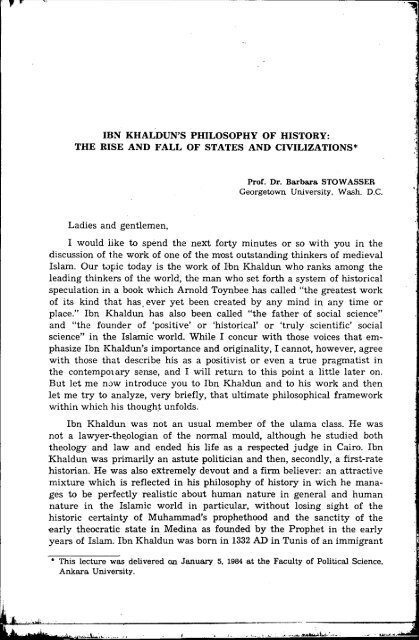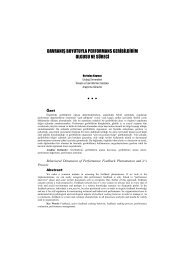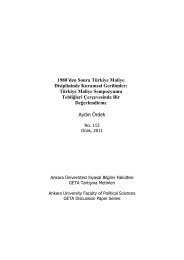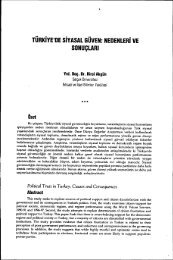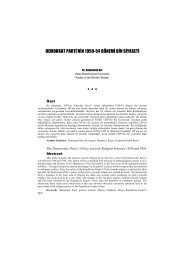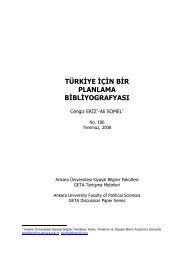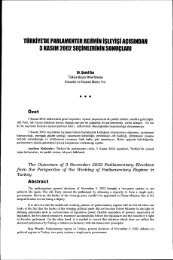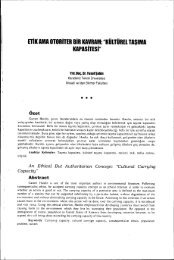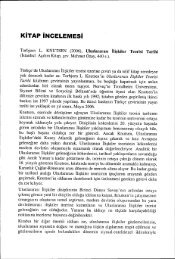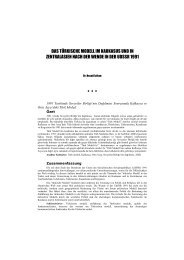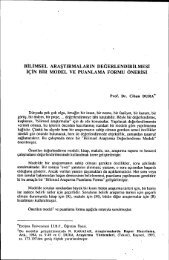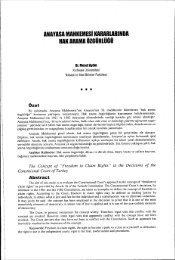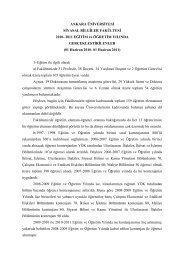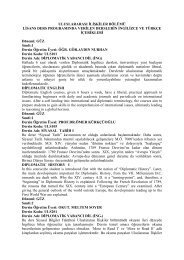ıBN KHALDUN'S PHILOSOPHY OF HISTORY: THE RISE AND FALL ...
ıBN KHALDUN'S PHILOSOPHY OF HISTORY: THE RISE AND FALL ...
ıBN KHALDUN'S PHILOSOPHY OF HISTORY: THE RISE AND FALL ...
You also want an ePaper? Increase the reach of your titles
YUMPU automatically turns print PDFs into web optimized ePapers that Google loves.
. ,.'ıBN <strong>KHALDUN'S</strong> <strong>PHILOSOPHY</strong> <strong>OF</strong> <strong>HISTORY</strong>:<strong>THE</strong> <strong>RISE</strong> <strong>AND</strong> <strong>FALL</strong> <strong>OF</strong> STATES <strong>AND</strong> CIVILlZATIONS*Prof. Dr. Barbara STOWASSERGeorgetown University. Wash. D.C.Ladies and gentIemen,i would like to spEmdthe next forty minutes or so with you in thediscussion of the work of one of the most outstanding thinkers of medievalIslam. Our topic today is the work of Ibn Khaldun who ranks among theleading thinkers of the world, the man who set forth a system of historicalspeculation in a book which Arnold Toynbee has called "the gr€atest workof its kind that has. ever yet been created by any mind in any time orplace." Ibn Khaldun has also been called "the father of social science"and "the founder of 'positive' or 'historical' or 'truly scientific' socialscience" in the Islamic world. While i concur with those voices that emphasizeIbn Khaldun's importance and originality, i cannot, however, agreewith those that deseribe his as a positivist or even a true pragmatist inthe contempoıary sense, and i win return to this point a little later on.But let me now introduce you to Ibn Khaldun and to his work and thenlet me try to analyze, very briefly, that ultimate philosophical frameworkwithin which his though~ unfolds.Ibn Khaldun was not an usual member of the ulama class. He wasnot a lawyer-th~ologian of the normal mould, although he studied boththeology and lawand ended his life as a respected judge in Cairo. IbnKhaldun was primarily an astute politician and then, secondly, a first-ratehistorian. He was also extremely devout and a firın Deliever: an attractivemixture which is reflected in his philosophy of history in wich he managesto be perfectıy realistic about human nature in general and humannature in the Islamic world in particular, without losing sight of thehistoric certainty of Muhammad's prophethood and the sanctity of the-early theocratic state in Medina as founded by the Prophet in the earlyyears of Islam. Ibn Khaldun was bom in 1332AD in Tunis of an immigrant,. This lecture was delivered on January 5, 1984 at the Faculty of politicaı Science,Ankara University." ....1;. .A.. . ~ .• ..a •. ".l.,.":
186 BAR.BARA STOW ASSERpowerful force in the crcation of a civilization and its laws are the mosteffective instruments for preserving it.Civilization, or the culture centered around life in the cities, is thenatural completion of thr! life begun in the primitive culture. Primitiveculture is an incomplete form of culture. it satisfies only man's immediateneeds. Sedentary culture is complete. The conveniences and luxury candevelop when large numbers of people liye together in dense clusters,where some produce for all and a large amount of surplus Iabor is freedto produce the luxuries. 'lıhere is now time and energy for the fulfillmentof man's higher aspirations in the domains of the spirit and the intellect.But the development of all these luxuries carries in itself the germof degeneration and decline. The simplicity, the crude strength, the simpleloyalty of the original group have became corroded. All societies, states,cities, economies, and cUıtural endeavors are caught in this inescaple eylicaldevelopment: theyarise from a simple and forceful beginning, developto an optimal point, and then cOITodeand decline.The one cycle which fascinated Ibn Khaldun most - since his primeinterest continued to lie in political matters - was the cycle of rise andfall of the state. Ibn Kha:dun here distinguishes £ive stages. A state cango through the whole cycle within the span of three or four generationsof rulerS.In the beginning, the first stage is the period af establishment. Groupsolidarity here is based on ties of familyand on religion and is essentialfor the preservation of the state. The ruler is more a chief than a lordor a king. He himself has to folIow the rules of religion.In the second stage, the rulersucceeds in monopolizing power. Hebecomes an absolute master. This monopoly of power by the ruler is thenatural and necessary end of the rule that began on the basis of naturalgroup solidarity. The ruler can now build a welI-Ol'dered state. To achievemonopolization of power, he destroys those who share power with him,gets rid of the natural solidarity that supported him in the beginning,and purchases the support of bureaucrats and mercenaries who are loyalto him -their employer- and not to a kinship-solidarity or a religiouscause. In addition to the paid army and administrative bureaucracy, agroup of learned advisors beromes instrumental in preserving the stateaccording to the rllier's wbhes. On the matter of the advisory corps, IbnKhaldun emphasizes that scholars make bad political advisors. Since theyare trained to see the universals rather than the partieulars, the speciesrather than the individual specimen, since they grasp social and politicalphenomena in analogy to others ratheı: than on their own merits and in
IBN <strong>KHALDUN'S</strong> <strong>PHILOSOPHY</strong> 187their own, particular, uniqueness, theyare prone to give bad politicaladvice. Good political advice for the ruler comes from "ordinary, soundmen of average intelligence."The third is one of luxury and leisure when the ruler uses his authorityto satisfy his personal needs. He reorganizes the finances of the stateto increase his own personal income by lowering the tax burden on hissubjects: this results in large revenue from smaIl assessments. He thenspends lavishly on public works and on the beautification of his cities.There is economic prosperity for everyone, the crafts, fine arts, sciencesare encouraged, the new ruling dass and even the upper strata of themiddle class become avid patrons for cUıtural pursuits and projects. Theatmosphere is one of leisure and self-indulgence, all men enjoy the comfortsand pleauSers of the world.In all three of these stages, the rulers are powerful, independent, ,andcreative, They satisfy their own desires and their subjects' desires withoutbecoming slaves to them. The resulting economic prosperity constitutesan instrument of additional power for the ruler.The fourth stage is a stage of contentment, satiation, and complacency.Luxury and comfort have become ahabit. Ruler and ruled are confidentthat they wiUlast forever. And they may indeed last for quite some time,as the length of this period depends upon the power and the solidity ofthe achievements of the founders of the state. But during this stage, thestate is aıready, imperceptibly, starting to decline and to disintegrate,and the fifth and last stage of prodigality and waste begins.it now becomes painful1y evident that the vital forces of solidarityand religion were destroyed in the beginning and that the strong naturalloyalty of the kinsmen wasreplaced with the purchas'ed support of thearmy and the bureaucracy who are not willing to sacrifice themselves forthe ruler. To ensure their continued support and to maintain the luxuries,t~e ruler has to raise the taxes, with the result that the newly increasedtax assessments yield a smaU and ever-decreasing amount of revenue,'because this tax policy discourages economic activity. As the income ofthe state dedines, it ultimately becomes impossible for the ruler to 'supporthis new foUowers. The habits of comfort and luxury have generated physicalwea'kness and vice. The rough and courageous manners of the earlyprimitive life are forgotten. The population has become effeminate. Thehopes of the ruled are weakened, public opinion is marked by despair,economic activity, building projects are halted. People refrain from makinglong-range plans. The birth rate drops. The entire p6pUıation, physicallyweak and living in large crowded cities with enviromental problems,
188 BARBARA STOW ASSER..•.becomes subject to diseasf~and plague. The state begins to disintegrate.From the outlying regions, princes, generals, dissatisfied kinsmen, andforeign conquerors snatch pieces of territory from the control of the state.The state is divided and subdivided into smaIl provinces. Even in the capital,the military and the bureaucrats engage in intrigues to wrest theactural authority form the ruler, leaving him only with the insignia ofhis office and the name. Finally, an outside invasion by a young, healthygroup may put an end to the life of the state, or it may decline furtherand further until it wither;~away "like a wick dying out in a lamp whoseoil is gone."Not every conquest has to mark a new beginning. Civilization isattractive to the primitiye conquerors and so they try to imitate the customsand practices that thi~y find when they arriye. The mastery of eachcraft or science, no matter how difficult, tends to become a habit, andtherefore can be taught to others, provided that the proper methods ofinstructionare known and that. the political upheaval is not too drasticand destructive.And so all political life and all eultural life moves in never--endlng,always repeated eycles. There is no progress from one eycle to the next.The notion of progress aetually is laeking altogether İn Ibn Khaldun'sphilosophy, as it is in all of Arab medieval thought.As he depiets the rise and fall of dynasties and states and eulturesin purely seeular terms, Ibn Khaldun gives a much more aeeurate aecountof what happened in the Islamie world beforeand during his own timethan those PlOUS lawyer-theologians who tried to deseribe the IslamieMiddle Ages in the terms of the early Islamic theocraey. And yet, IbnKhaldun was asincere' belif!\'er and that early theocracy was as importantto him as it was to those pious writers who struggled to keep th'eir utopiaalive. How then does Ibn Khaldun deal with the beginnings of Islam? Hedoes so at an aıtogether different leveL.Things were not always this grim,he says, the movement of rise and decline was not always this ineseapable.Both the establishment of Islam and its very early history represent adirect divine interventian in' human affairs. For a few generations, groupfeeling was nothing and submission to the will of God was everything.The periods {n which religion was thernain force of motivation were theorthodox ealiphate (632-661),the very early years of the Umayyad kingdom,and then again the very early years of the Abbasid empire. Duringthese periods, the eommunity flourished and eonquered. But then theexperience paled and its initial tremendous impact was lost. Islam eeasedto be the sole source of unity and agreement, and the old mysteriouseohesive power of natural group feeling had to eome to the füre again.
. ,J;AIBN <strong>KHALDUN'S</strong> <strong>PHILOSOPHY</strong> 189And man who was too weak to keep the original faith experience aliyehad to revert to the inescapable grimness of cyclical existence. Here theIslamic community could have escaped the cycle: by holding fast to thelaws of God and the new religion, and by avoiding materialism and greedand corruption. Their sinful failure- to do so resulted in their loss of freedomand their inevitable dedine.Before i ı:onclude with some remarks on the question of the "secularism"and hence the whole q:uestion of the "modernity" of Ibn Khaldun,let me say that Ibn Khaldun's ideas were in some ways too realistic andhence revolutionary for the intellectually stagnant society in which helived and worked. There is very little evidence that he had any impacton Arab thought in the Iate 14th or early 15th centuries. it was only inthe 16th and particularly in the 17th centuries that an Ibn Khaldun rediscoverygot underway, and the. people who rediscovered and read andcommented upon him were the Ottoman Turks. The Ottomans, as youknow, concentrated much of their intellectual interest upon historyandpolitical thought, and they were fascİnated with Ibn Khaldun. In the16th, 17th, and 18th centuries, the study of Ibn Khaldun constituted animportant segment of Turkish intellectual history. it was only in the19th century that Europa joined the Turks in reading Ibn Khaldun.You will agree with me that, as ıbn Khalc;un grasps that fundamentaland specific element which constitutes political reality, he comes acrossas arealist. In his description of the rise and fall of Islamic societies andcultures, in his analysis of Islamic states, this political realism, this interestin the concrete manifestations of social and political entities givehis work a much more "modern" flavor than is to be found even withmany present-day Muslims writers who are generally -more theocı:atic/utopian in their- id~as. Yet, when it comes to the relationship of religionand politics, there is a tremendous distance between Ibn, Khaldun's politicalpragmatism and, let's say, Machiavelli's political philosophy. AsMachiavelli ponders the rise and fall of nations and cultures in his Dİscoursesand in The Prİ'ııce, he also relies on religion as the main sourcefor social solidarity. Paradoxically, he actually does so to an even higherdegree than Ibn Khaldun. Without religion, says Machiavelli, nationscannot develop "virtue" (political strength and cohesiveness) since it isonly on the basis ıof observed religion that good institutions can be establishedwhich then restrain individual selfishness and thus ensure th2supremacy of the common good. In other words, Machiavelli sees religionas political1y useful. However, he is not concerned with religion as GodgivenTruth and Law, not does he seethe corruption of religion as aresu1t of human weakness, and sin. Both the rise and fall of religion to
190 BARBARA STOW ASSERMachiavelli are merely observable historical facts. Religion, he says, isuseful and even indispensable in politics, in the building of a civilization,and in deterring its decline, but he is completely indifferent to the truthof religion. Machiavelli is a true pragmatist and positivist. Ibn Khaldun,on the other hand, is not. The great emphasis wich he puts on historical"facts and reality gives his work the flavor of pragmatism. This pragma~tism, however, is ultimately and essentially alien to his philosophy, becauseIbn Khaldun ultimately views the concrete and particular events, theirmultipIicity and change, a3 only a beginning from which to get at theessential structure behind the brute facts of history. Ibn Khaldun seesreligion, at least in the cas,~of Islam, as not one more historica! fact butas The Truth that provides "the underlying -principle", the immutablestandard that transcends all history and all poIitical development. IbnKhaldun, therefore, never perceived government as an autonomous, secular,activity capable of making its own morality which can be consideredapart from religion.Thus, I contend that J1)n Khaldun did not develop, nor did he seekto develop, a truly s'ecular philosophy of history or a truly secular scieneeof politics' and society. Lately it has been fashionable to claim that hedid. Yet just as Ibn Khaldun never reeognized the idea of governmentas an autonomous seeular activity so also did he not develop the idea ofthe state as independent from religion that derives its legitimacy fromother sources and is fit to make its own morality. To/my mind, therefore,Ibn Khaldun remained essentially and devoutly within the mainstreamof orthodox Islamic political philosophy, and his philosophy of historyreflects his conviction that -"vhileit is neeesary to know the exaet natureof man and society, both social and politieal, such knowledge is notpossible "without knowing the true end of man and society." The notianof division and separation of religion and politics, wlıich has gainedground in the West to a pOİ!ıt where, in most peoples' opinion, politicaldevelopments is "inversaly related to religion in politics" -this notion hasits roots in Western thought or, more specifieally, in the Western Renaissance.Whether, of eourse, it has meant pure blessing or pure harmor something in betwee~ for our own 'civilization is anather matter. Butthe id'eal itself was not iornıulated by Ibn Khaldun, who is classical Islam'sseemingIy most pragmatic, seemingIy most seeular thinker. Underneathhis pragmatism, Ibn Khaldun lets us pereeive his deeper convietion:the conviction that adlıerence to the true religion can and shouldinsure the creation of God's Kingdom on Earth, an everlasting GoldenAge. it and when this is achieved, he tells us, civilizations, need not andwill not rise nar fall again.


